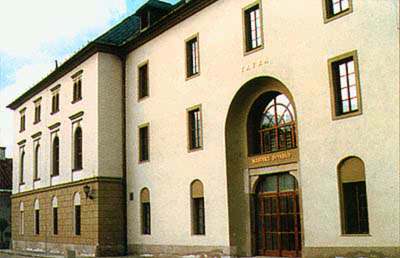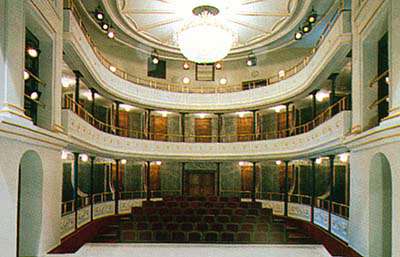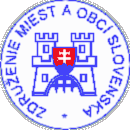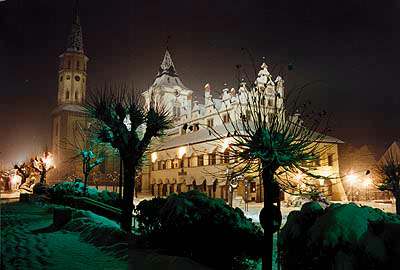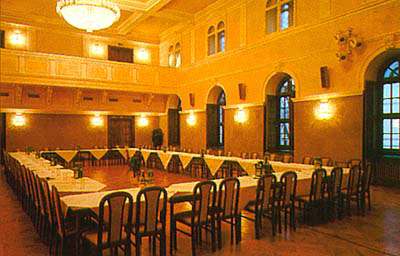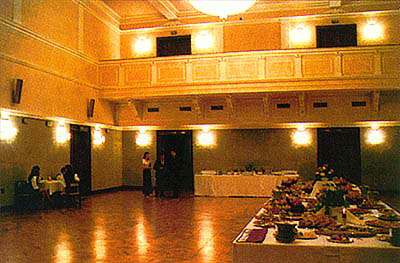|
|
|
|
|
Attraction highlighting:
The Altar of Master Pavol from Levoca |
|
|
|

Levoca is situated in the north-western part of Eastern Slovakia, in the
Spis region, and on the southern foot of Levocske mountains. The oldest finds
from this area date back to the 9th century and the first written reference is
found in 1249.
The visitor has many cultural and historical monuments to admire in the town,
these include St. Jacob`s Temple, the Town Hall, Evangelical Church, The Cage of
Shame dating back to the Middle ages and around 60 houses dating from 14th
and 15th century. These can all be found in
an area known as Master Pavol`s Square. This significant square is one of the
biggest of this sort in Europe and together with conserved renaissance houses,
it gives you a typical picture of the town in the Middle ages. The most
important houses in Levoca are: Thursov house, Hourse of Majster Pavol,
Mariassyho house, Spillenbergov houseand Krupekov house. The town is almost
completely surrounded by the original walls which include 15 bastions, 6 towers
and 3 gates: Kosicka gate, Polska gate and Menhardska gate. In 1950, the
historical centre of Levoca was awarded the Town Monument Reservation order to
preserve it for generations to come.
Levoca, together with other towns situated in Spis and Gemer region, is an
important part of tourist trail called “The Gothic Path” which is 267
kilometres long. This path enables the visitor to enjoy some magnificent
historical gothic monuments, beautiful natural features and it also offers many
areas to simply relax. For the visitor who wishes to spend a little longer in
the area there are a number of local hotels in which to spend a pleasant night
or two.
Places of Interest

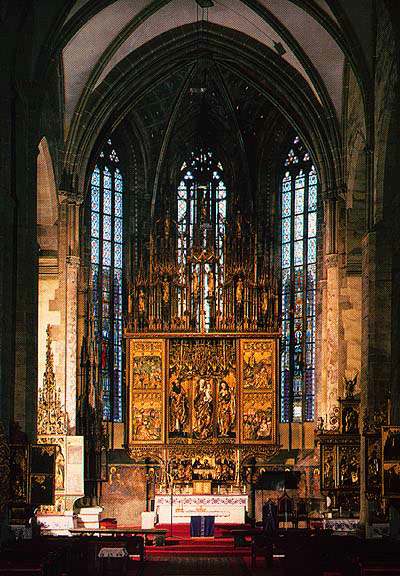
|
St. Jacob`s Temple
Situated on the northern part of town`s square, St. Jacob`s Temple is a
three-ship church with a massive sanctuary and beautiful gothic arches. There
are also 11 original local gothic and renaissance altars conserved in this
church. The most valuable monument of St. Jacob`s Church is The Altar of St.
Jacob made my Master Pavol from Levoca in the early 16th
century. It is the highest gothic altar in the world, with a height of 18.62 m.
It enjoys the status of being a National Cultural Monument.
The Town Hall
The Town Hall originally comes from 15th
century and was destroyed by fire on a couple of occasions during 16th
century. In 1615, it was extended and the southern part together with some
lovely arcades were built on the first and second floor. The outside walls are
decorated by paintings showing symbols of civil virtue such as temperance,
precaution, courage, patience and justice.
The renaissance tower, used as a bell house in the past, is now connected to the
Town Hall. The visitors can also find Spisske museum in this building and the
Meeting Hall which is currently used for local governmental purposes.
Congress hall
Evangelical Church
This classical church is situated in the southern part of the square and was
built in the shape of Greek cross with a huge cupola.
Town Theatre
The Town Theatre is place in the western part of the square and it has an
important cultural function among all those magnificent town monuments. After
its recent renovation, it has had its original look from 19th
century returned. In this cultural and social complex we can find the Congress
Hall, the Theatre Hall, two conference rooms and the Blue Lounge. The Theatre
offers a huge variety of performances, plays, cultural events, congresses,
seminars, training courses and social meetings.
Surrounding of Levoca
Marianska Hora is the neo-gothic church situated on the steep hill around
Levoca. It is known as one of the pilgrim places. Its chapel, originally built
in 13th century, has been reconstructed and
repaired a couple of times. From 1906 till 1914 the new church with neo-gothic
altar was built for wanderers and its major feature is a late gothic sculpture
of Holy Mary created in 15th century
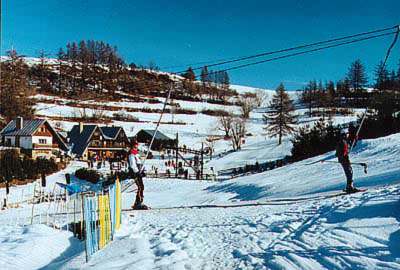
The Ski Centre Zavada is very well placed for a long skiing season enabling
visitors to ski until late spring.
FOTO: František Brincko, Štefan Pechy
|
|
|

|
|
|


